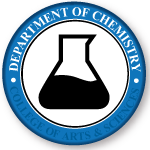Document Type
Article
Publication Date
2013
Publication Title
Chemotherapy Research and Practice
Volume
2013
Issue
360624
First Page
1
Last Page
7
Abstract
Lomustine is a nitrosourea anticancer agent shown to be effective for treatment of childhood medulloblastoma. In silico substructure searches produced 17 novel nitrosourea agents analogous to lumustine and retaining activity for DNA alkylation and cytotoxic activity. The mean values for Log P, polar surface area, formula weight, number of oxygens & nitrogens, and rotatable bonds were 2.524, 62.89 Anstroms2, 232.8, 5, and 2, respectively. All 17 agents have formula weight less than 450 and Log P less than 5, two criteria preferred for blood-brain barrier penetration.These agents have a polar surface area less than 90 Angstroms2. Each show zero violations of the Rule of five indicating favorable drug likeness and oral drug activity. Hierarchical cluster analysis indicated that 16 of the novel agents were highly similar to lomustine, save for agent 12 which bears a hydroxylated branched carbon substituent. A total of 17 novel anticancer agents were elucidated having molecular properties very effective for penetrating through the BBB and into the central nervous system. This study shows the effectiveness of in silico search and recognition of anticancer agents that are suitable for the clinical treatment of brain tumors.
Recommended Citation
Bartzatt, Ronald, "Lomustine Analogous Drug Structures for Intervention of Brain and Spinal Cord Tumors: The Benefit of In Silico Substructure Search and Analysis" (2013). Chemistry Faculty Publications. 45.
https://digitalcommons.unomaha.edu/chemfacpub/45


Comments
Copyright © 2013 Ronald Bartzatt. This is an open access article distributed under the Creative Commons Attribution License, which permits unrestricted use, distribution, and reproduction in any medium, provided the original work is properly cited.